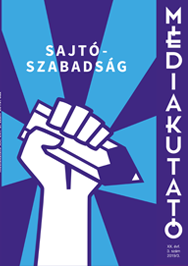Contents – Autumn 2019
Martin, József Péter:
Martin, József Péter:
Sliding Hand-in-Hand
The first part of this paper discusses the challenges that researchers face when defining and measuring press freedom and corruption. The second part looks into the interplay of media freedom and corruption in general and in Hungary in particular. While both the slide of media freedom and the institutionalisation of corruption are in line with global trends, the Hungarian case evinces some peculiarities. Unfolding these helps us understand why systemic corruption has not been broken in Hungary despite investigative media covering corruption scandals.
Keywords: corruption, press freedom, media
Médiakutató Autumn 2019 pp. 7-21
Schleicher, Nóra:
Schleicher, Nóra:
Mirror, mirror on the wall, who is the fairest of them all?
Gender and visual self-representation on Facebook
Keywords: Facebook, gender, profile photo, identity, self-representation, visual analysis, teenager, SNS
Mirror, mirror on the wall, who is the fairest of them all?
Médiakutató Autumn 2019 pp. 25-37
Veszelszki, Ágnes – Falyuna, Nóra:
Veszelszki, Ágnes – Falyuna, Nóra:
Using linguistic-argumentative tools to disclose pseudo-scientific contents
Pseudo-scientific contents can spread quickly and widely in the ever-changing information and media environment, which makes scientific analysis on identifying these contents particularly valuable. This paper presents the linguisticargumentative characteristics of pseudo-scientific contents spreading on the internet via three case studies (flat earth theory, anti-vaccination movement and parasitic infections), and offers some analytical tools to identify pseudoscientific and unreliable information. It concludes with a list of critical questions based on the relevant literature and the authors’ own teaching practices.The aim of this paper is to show that the analysis of the linguistic-argumentative characteristics of pseudo-scientific contents as a means of evaluating information credibility can contribute to the development of critical interpretative skills and communicational-pedagogical methodologies.
Keywords: argumentation techniques, critical skills, deception, digital communication, fake news, media awareness, pseudoscience, science communication, social media, terminology
Using linguistic-argumentative tools to disclose pseudo-scientific contents
Médiakutató Autumn 2019 pp. 39-51
Szemes, Botond:
Szemes, Botond:
DIY Cassette Culture in State-Socialist Hungary
This paper discusses how certain features of a DIY media environment had facilitated the making of Hungarian new wave, punk, alternative and skin subcultures (mainly based on music) in the 1980s. How could be the music recorded, transformed and spread through the whole country and abroad, and how ‘alter’ music scenes could be organised without any television, radio, press or magazine coverage due to the neglect and prohibition of cultural and political governance? How does the tape cassette function as an actor in this network? What are the specialties of this environment? These issues are studied as part of a research trying to unfold the political, social and aesthetic aspects of the subculture based on the tape cassette on the basis of interviews with former band members and fans.
Keywords: noise, tape casette, new wave, samizdat, recording, actor-network, medium
DIY Cassette Culture in State-Socialist Hungary
Médiakutató Autumn 2019 pp. 55-63




